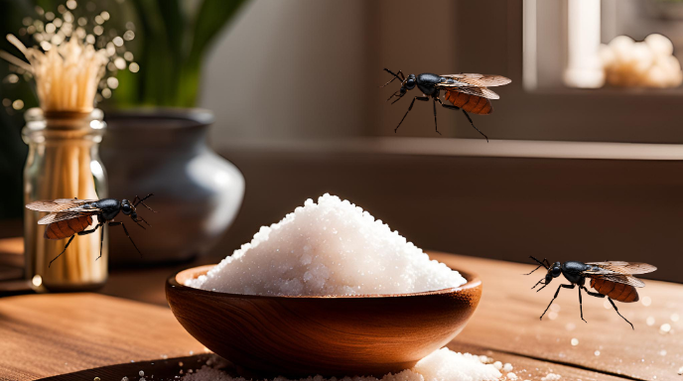When it comes to natural pest control, people often seek non-toxic alternatives to commercial insect repellents. Salt, a staple in many homes, might not be the first thing that comes to mind when thinking about repelling insects, but it has some surprising insect-repelling properties. While it may not offer the same potent effectiveness as chemical insecticides, salt can be used to deter certain pests in various ways. Let’s explore how salt works as an insect repellent, the types of insects it can help control, and how you can use it in natural pest management.
How Salt Acts as an Insect Repellent
Salt works as an insect deterrent in several ways, mainly by affecting the insect’s hydration and physical structure. When salt is applied to an insect, it can draw out moisture from the insect’s body through a process known as osmosis. Insects, like many organisms, rely on their moisture balance to survive. When salt interacts with their exoskeleton or soft tissue, it can dehydrate them, leading to death or forcing them to avoid the area. This makes salt a useful tool for controlling certain pests without the use of harsh chemicals.
However, salt is not a universal insect repellent and is not effective against all pests. It tends to work best on smaller pests, such as ants and snails, or in situations where the salt can create a barrier or be sprinkled in areas that insects are known to frequent.
Types of Insects Salt Can Help Deter
-
Ants: Salt is particularly effective in keeping ants at bay. Sprinkling salt around the perimeter of your home, along ant trails, or directly on anthills can disrupt their scent trails and act as a barrier. Ants rely heavily on pheromones to navigate, and salt can interfere with their ability to follow these scent trails, leading them to look for another route.
-
Slugs and Snails: These pests are highly sensitive to salt. When salt comes into contact with them, it can draw water out of their bodies, causing them to dehydrate and eventually die. This makes salt a natural and effective option for controlling slugs and snails in your garden. Simply sprinkle salt around plants or areas where these pests are likely to appear.
-
Fleas: Salt can be used as a natural flea repellent for pets and in your home. By sprinkling salt onto carpets or pet bedding, it can help to dehydrate fleas and their eggs, reducing infestations. Vacuum thoroughly afterward to remove dead fleas and eggs.
-
Insects in the Soil: Certain types of soil-dwelling pests, like larvae or soil-based ants, can be deterred with a light sprinkling of salt. Just be cautious, as salt can also harm beneficial soil organisms and plants if used excessively.
How to Use Salt as an Insect Repellent
-
For Ants: Sprinkle salt along the trails of ants or around entry points where they’re entering your home. Salt can disrupt their pheromone signals, discouraging them from continuing their path. A simple saltwater solution (dissolving salt in water) can also be sprayed directly on ants or around their nests.
-
For Slugs and Snails: Create a barrier around plants by sprinkling a line of salt or saltwater around the base of the plant. Be cautious with the amount of salt you use, as too much salt can harm your plants or soil. You can also create saltwater traps by dissolving salt in water and leaving containers in areas where slugs are common.
-
For Fleas: To treat carpets or pet bedding, sprinkle salt liberally over the affected areas and leave it for several hours or overnight. Vacuum thoroughly afterward to remove any salt and dead fleas. For pets, be sure to use a safe, pet-friendly approach, such as sprinkling a small amount of salt on their bedding or in areas where fleas are common.
-
In the Garden: For soil-dwelling pests or to create an insect barrier around plant beds, mix a small amount of salt into the soil around the affected areas. Be cautious with the concentration of salt, as too much can alter the soil's salinity, potentially harming your plants.
Limitations and Considerations
While salt can be useful in repelling certain insects, it’s important to consider its limitations and potential downsides.
-
Harm to Plants: Salt can damage plants and soil if used in large quantities. It can alter the balance of essential minerals in the soil, making it less fertile. This is especially important in garden settings—while salt is effective for controlling slugs, it should be used sparingly around plants.
-
Not Effective for All Pests: Salt is not effective for all types of insects. It works best on smaller pests like ants and snails but is unlikely to have much effect on larger pests, such as mosquitoes, flies, or ticks. For those pests, you may need to rely on other natural repellents like essential oils or plant-based sprays.
-
Environmental Impact: If too much salt is used in outdoor settings, it can impact the surrounding ecosystem. Excessive salt can run off into nearby water sources, harming aquatic life and plants. Always use salt cautiously and only in areas where you’re certain it won’t cause environmental damage.
Alternative Natural Insect Repellents
If you’re looking for broader, more effective natural insect repellents, consider alternatives such as:
- Essential Oils: Oils like citronella, eucalyptus, and peppermint are widely known for their insect-repelling properties. They can be used in sprays, candles, or diffusers to keep mosquitoes and other pests at bay.
- Diatomaceous Earth: This fine, powdery substance is non-toxic to humans and animals but lethal to insects with exoskeletons. It works by dehydrating pests like ants, cockroaches, and fleas.
- Neem Oil: Known for its insecticidal properties, neem oil can be used to repel a wide variety of garden pests and insects.
Final Thoughts
While salt can be a helpful natural insect repellent, it’s best used as part of a broader strategy for pest control. Its effectiveness is most notable with pests like ants, slugs, and fleas, but it may not work for larger or more persistent insect populations. When using salt, always be mindful of its potential to harm plants or the environment. As with any natural remedy, moderation is key.




